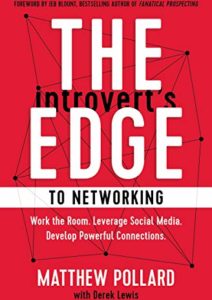In this Expert Insight Interview, Matthew Pollard discusses introverts and selling, focusing on both networking and sales. Matthew Pollard is the author of The Introvert’s Edge to Networking and The Introvert’s Edge to Sales.
This Expert Insight Interview discusses:
- Why introverts are hesitant to become salespeople
- The grey area in the introvert vs extrovert classification
- How introverts can be more successful than extroverts in “extrovert arenas”
Adopting a System
There are many introverts who aspire to be exceptional leaders and salespeople, as well as those who seek to network and run their own businesses. The unfortunate thing is that these people have always thought that they could only expect subpar performances from themselves, which prevented them from even trying.
What’s funny about this is that many people in sales leadership are introverted, too, except they gravitated to a system. There’s this widely accepted belief that introverts can’t sell, yet some of the most successful salespeople happen to be introverts.
The Soft Skills Advantage
But what really gives introverts an edge in sales? It often comes down to their soft skills—those subtle yet powerful abilities that build genuine rapport with customers.
Empathy is a key strength. Many introverts have a natural ability to see the world through someone else’s eyes. When a potential client feels truly understood, it lays the groundwork for trust—which, as any seasoned seller will admit, is a prerequisite for meaningful business relationships.
Then there’s active listening. While some might be rehearsing their next pitch, introverts are actually tuned in, absorbing the client’s words and reading between the lines. This isn’t just about nodding politely. By really listening, introverts uncover the nuances of each customer’s needs and pain points. That information becomes gold when it’s time to propose solutions tailored just for them.
Together, skills like empathy and attentive listening don’t just help introverts make sales—they lay the foundation for lasting partnerships.
Boosting Confidence Through Research and Preparation
One of the most significant advantages that introverts naturally possess is their tendency to research and prepare in advance. When it comes to sales, this trait isn’t just helpful—it’s a secret weapon.
Let’s face it, few things boost confidence like walking into a meeting knowing you’ve done your homework. By investing time to understand your prospect’s needs, goals, and potential objections before any call or presentation, introverts set themselves up for success. Digging into details, reading up on a client’s business challenges, or even jotting down thoughtful questions can turn what feels like a leap into the unknown into a well-mapped journey.
Taking this a step further, many introverts find practicing their sales pitches with a friend or colleague invaluable. This could mean rehearsing answers to tricky questions or role-playing through common sales scenarios, making the actual event feel more like déjà vu than stage fright. Not only does this reduce nerves, but it also helps introverts appear more poised and adaptable during real interactions.
In short, while some might rely on quick thinking “in the moment,” introverts thrive by being one step ahead—and that solid groundwork is often the cornerstone of their quiet confidence in sales.
The Power of Authenticity for Introverts in Sales
One of the often-overlooked strengths that introverts bring to the sales table is their authenticity. Unlike the traditional image of the slick, fast-talking salesperson, introverts tend to favor honest communication and genuine relationships naturally. This isn’t just refreshing; it’s a real advantage.
Because introverts excel at listening carefully and responding thoughtfully, clients often find their approach trustworthy and comforting—a sharp contrast to the pushy, “used car salesman” vibe that usually tarnishes the profession’s reputation. In fact, many business owners find it easier to open up and discuss their actual needs with a salesperson who comes across as genuine and approachable.
Rather than trying to mimic extroverted behaviors or memorizing canned pitches, introverts should play to their strengths:
- Listen before speaking. Demonstrate to clients that you care about their concerns by giving them your undivided attention.
- Ask questions that matter. Dive deeper into what the client actually wants, instead of sticking to a script.
- Offer bespoke solutions. Use your understanding to connect products or services meaningfully to their needs.
By staying true to themselves, introverts not only sidestep the discomfort of “acting extroverted” but also build authentic relationships that lay the foundation for long-term success in sales. Embracing this authenticity doesn’t just feel better—it works.
Sales Roles Tailored for Introverts
So, what kinds of sales positions play to the strengths of introverts? You might be surprised to learn that some of the most effective sales roles for introverts are the ones that hinge on thoughtful relationships and a consultative approach, rather than fast-talking or constant mingling.
Think about fields like IT solutions, engineering products, or pharmaceuticals—sectors where clients expect expertise, not theatrics. Here, success stems from careful listening, deliberate planning, and providing well-considered recommendations rather than flashy pitches.
Introverts often thrive where there’s room for preparation and the space to build meaningful connections over time. If you crave structure and prefer in-depth conversations to playing the room, roles that prioritize long-term relationship-building—such as account management, technical sales, or advisory positions—may suit you perfectly.
Ultimately, it’s all about finding sales environments that recognize and reward your ability to listen deeply, analyze thoughtfully, and solve clients’ real problems with genuine care.
Turning Technology Into Your Sales Advantage
One often overlooked secret weapon for introverts in sales? Technology. The digital era has created a playing field where quiet thoughtfulness usually has the upper hand.
Remote channels—such as email, LinkedIn, and Zoom—allow introverts to take a moment, organize their thoughts, and craft nuanced responses, rather than relying on quick-witted banter or in-person charisma. Research even shows that the majority of buyers prefer this more thoughtful digital communication over face-to-face meetings. According to a McKinsey report, as many as 76% of decision-makers now favor remote human engagement.
What does this mean for introverted salespeople?
- Time to Think: You can draft well-considered emails or proposals, making your expertise (and care) shine.
- Better Follow-Ups: Social media and CRM tools make follow-ups less daunting and more strategic—no more dread of cold calls.
- Flexible Presentation Styles: Video conferencing provides structure to conversations, with visual aids and screen shares to support you if speaking off the cuff isn’t your forte.
- Empowered Buyers: Digital resources, such as customizable pitch decks or interactive guides, enable buyers to explore solutions at their own pace—often moving themselves closer to the decision line with little need for persuasive theatrics.
By utilizing these digital tools for thoughtful connection, introverts can transform what once seemed like a weakness into a distinct advantage in the world of sales.
Introvert vs Extrovert Scale
People tend to view things in very black-and-white terms in many ways. For example, we classify people as either introverts or extroverts. This is problematic because, like many things in life, introversion vs extroversion is a scale. There are many introverted extroverts and extroverted introverts out there, as counterintuitive as that may sound.
In fact, recent research highlights the concept of “ambiverts”—individuals who land somewhere in the middle of this spectrum. Ambiverts are a blend, possessing traits of both introversion and extroversion. This balance enables them to be flexible in their approach, especially in roles such as sales. While extroverts may excel at initiating conversations and building rapport, they can sometimes struggle with active listening and risk coming across as too pushy. Introverts, meanwhile, excel at listening and empathizing with others but may occasionally find assertiveness challenging.
Ambiverts, with their ability to switch between talking and listening, as well as assertiveness and empathy, often find tremendous success. But this doesn’t mean that introverts or extroverts can’t be outstanding sales professionals. The real key is understanding where you naturally fall on the spectrum and then leveraging your unique strengths to your advantage.
There are many nuances to this matter, which is perhaps what often prevents many introverts from pursuing a career in sales. In other words, they believe that sales is an extrovert’s game, and they don’t even dare to get involved.
Research on Extraversion and Sales Performance
You might wonder if there’s solid scientific evidence backing the idea that extroverts have an advantage in sales. Interestingly, the research tells a very different story from the stereotypes.
Multiple studies have explored whether being outgoing actually leads to better sales results. The consensus? There’s no meaningful link between extraversion and sales performance. For example, research led by Murray Barrick at Michigan State University found no evidence that extraverted personalities sell more or better than their quieter colleagues. In fact, the most “in-your-face” salespeople—the ones you’d expect to dominate the field—often turn prospects off rather than closing deals.
What’s truly eye-opening is that top-performing salespeople tend to display more humility and modesty, not less. They also show lower preferences for constant socializing compared to their average-performing peers. This pattern was confirmed in further research, including a well-known study led by Adam Grant at the Wharton School, which found that the best salespeople often operate somewhere in the middle of the introvert-extrovert spectrum.
So, if you’ve ever doubted your place in sales because you don’t fit the stereotype, rest assured—the evidence is firmly on your side.
Managing Energy for Introverts in Sales
This leads to an essential point for any introvert considering, or currently working in, sales: managing your own energy is crucial. Unlike extroverts, who seem to thrive on constant interaction, introverts often find that too much social engagement can leave them feeling depleted—not necessarily because they don’t enjoy people, but because those interactions use up more of their mental batteries.
As a result, overextending yourself by jumping from meeting to meeting or making endless sales calls can quickly lead to exhaustion and, ultimately, burnout. That doesn’t mean introverts can’t flourish in sales—it just means the path to success looks a little different.
Finding ways to balance outward-facing activities with restorative “quiet time” is vital. Consider simple tactics like:
- Scheduling short breaks between meetings to recharge
- Taking a walk after a jam-packed networking event
- Building blocks of focused work time into your day where you’re not required to be social
- Starting and ending the day with a few peaceful moments, whether it’s meditation, listening to music, or just enjoying a cup of coffee alone
The true secret is making sure that quality—not quantity—drives your interactions. By intentionally conserving and renewing your energy, you’ll be sharper, more present, and ultimately more effective when it counts most.
Extrovert Arenas
When introverts get successful in so-called “extrovert arenas,” it is because they’ve learned the skills to be successful in them. Matthew Pollard stipulates that there is no such thing as extroverted arenas.
Introverts can out-sell, out-network, and out-lead their extroverted counterparts because they tend to focus on processes and systems, which introverts often handle more successfully. Systems and processes will always overcome “just winging it,” but the problem is that extroverts can “wing” things from day one, which makes introverts think they should not get engaged. However, if an introvert focuses on a system from the very beginning, they can beat any extrovert at their own game.
Lean Into Your Strengths
Introverts naturally excel at soft skills like empathy and active listening—traits that often make the difference between a one-time transaction and a long-term client relationship. While extroverts might dominate the room with their energy, introverts are masters at tuning in, making customers feel truly understood, and crafting solutions tailored to real needs.
Instead of engaging in endless small talk or trying to out-charm others, introverts thrive by asking thoughtful questions and patiently absorbing the answers. This means fewer wasted words and more meaningful connections, which frequently lead to higher trust and, ultimately, better sales results.
Protect Your Energy
It’s no secret that introverts need downtime to recharge. The sales world can be relentless—calls, meetings, events—but introverts who respect their own limits and carve out quiet time maintain their edge. It’s not about the sheer volume of interactions, but the quality and impact of each one. A well-timed walk or a few moments of solitude can do wonders for effectiveness.
Choose Your Arena Wisely
Not every sales environment is a fit for every personality. Introverts tend to shine where the sales process values depth over speed—think IT, engineering, or pharmaceuticals—where understanding the product and the customer’s unique challenges outweighs the need to be the loudest voice in the room. When possible, seek out roles and companies that appreciate relationship-building and thoughtful analysis over constant hustle.
Use Technology To Your Advantage
Today’s digital landscape is a gift to introverts. Tools like email, social media, and video calls allow for deliberate, well-composed communication—no need to “perform” in every interaction. With so many buyers now preferring remote engagement, introverts can use this to their advantage, crafting thoughtful responses and proposals at their own pace.
Quality Over Quantity
The myth that more calls equal more sales doesn’t hold up. Introverts are at their best when focusing on deeper, more meaningful relationships rather than spreading themselves thin with superficial interactions. Research continues to show that strong client engagement pays dividends far beyond what a high call count can achieve.
Prepare and Practice
Preparation is the introvert’s secret weapon. Taking time to research prospects, anticipate objections, and practice responses builds confidence and leads to smoother interactions. Role-playing challenging scenarios or rehearsing key points before a call can turn nerves into an advantage.
Authenticity Wins
Above all, introverts succeed because they bring authenticity to the sales process. Clients can sense when they’re being listened to and understood, and that genuine approach often feels like a breath of fresh air in an industry full of “hard sells.” Instead of trying to mimic the stereotypical extroverted salesperson, introverts should embrace their strengths—process, preparation, empathy, and authenticity. These are the traits that turn prospects into loyal customers and make introverts formidable sales leaders.
Leveraging Empathy and Active Listening in Sales
A common misconception is that success in sales is reserved for those who love to talk, but often the opposite holds. Introverts are naturally equipped with two powerful assets—empathy and active listening—which can give them a decisive edge in building client relationships and closing deals.
Empathy, for instance, is a skill introverts typically master without even trying. Instead of pushing a product or service at every turn, introverts excel at tuning in to a prospect’s challenges and emotional cues. By truly understanding what a customer is going through, introverts can match solutions to real needs—not just perceived ones. This sense of being genuinely understood is what fosters trust and loyalty, ultimately leading to stronger partnerships.
Active listening is another tool in the introvert’s arsenal. While others might be waiting for their chance to jump in, introverts are often absorbing every word and nuance from their clients. This gives them access to underlying motivations and concerns—details that might go unnoticed by someone more focused on pitching than on listening. Armed with this insight, an introvert can ask better questions, tailor their approach, and offer thoughtful recommendations that hit the mark.
If you’re an introvert in sales, lean into these strengths. Focus less on dominating the conversation and more on creating spaces where your clients feel comfortable sharing their real priorities. You’ll not only differentiate yourself from the stereotypical “hard seller,” but you’ll also find that clients are more inclined to say yes—because they know you’re on their side.
Why Quality Beats Quantity for Introverts in Sales
Let’s address another myth that stubbornly sticks around in sales: the idea that more is always better. More calls, more emails, more handshakes at every networking event—for many, that’s the supposed recipe for success. But if you’re an introvert, you’re not wired to thrive off a whirlwind of surface-level exchanges. And that’s not a disadvantage—it’s actually your secret weapon.
Introverts naturally favor deeper, more thoughtful conversations. Instead of bouncing from one fleeting interaction to another, you have the gift of building genuine relationships that go below the surface. Real trust and connection aren’t built on a few hasty pitches—they emerge when you take the time to understand a client’s needs and goals truly. That’s where loyalty is forged.
Research even backs this up: customers who feel genuinely engaged and valued don’t just stick around—they bring more business and greater profitability along with them. So, rather than trying to win a numbers game, focus on the quality of your interactions. A handful of well-nurtured relationships can outperform a double-booked schedule filled with quick, forgettable chats.
Lean into what comes naturally—listening, empathizing, and connecting on a fundamental level. That’s how introverts consistently win, not by being everywhere at once, but by being the person their clients remember, trust, and return to.
Building Deeper Customer Connections as an Introvert
One of the real secret weapons introverts possess in sales is their ability to develop genuine, lasting relationships. While others may rely on charm and quick talk, introverts excel in the art of listening and understanding, which are the building blocks of meaningful engagement.
Instead of scattering your attention across endless calls or meetings, focus on quality over quantity. When you genuinely listen—actively, not just waiting for your turn—you get to the heart of what your customer needs. Ask thoughtful, open-ended questions. Let your customers share their challenges and goals. This approach doesn’t just help you gather the information you need to tailor a perfect solution; it makes your customers feel valued and understood. In a world flooded with generic sales pitches, being heard can make all the difference.
Empathy is another introvert superpower. By putting yourself in your customer’s shoes, you’re able to relate authentically and offer solutions that fit rather than force. In fact, research by organizations like Gallup consistently shows that customers who feel a genuine connection with their salesperson are far more likely to become loyal advocates, often boosting profitability for your company.
Here are a few practical tips:
- Replace small talk with meaningful questions—focus on the customer’s business, not your latest product features.
- Make space for pauses in conversation; allow customers to reflect and respond without pressure.
- Take detailed notes to remember personal details and address business challenges, thereby strengthening the relationship over time.
- Follow up with information or resources tailored to their specific needs, not just a generic “checking in” email.
Remember, you don’t have to be the loudest voice in the room to make the most impact. By leaning into your innate strengths—listening, empathy, and thoughtful engagement—you’ll forge stronger, deeper relationships that lead to loyalty and longer-term success.
Sales Environments Tailored for Introverts
It turns out, the sales world isn’t just a playground for extroverts who thrive on fast talk and constant banter. In fact, introverts can truly excel in specific industries and environments—especially where deep expertise and thoughtful communication are highly valued.
Consider industries such as IT, engineering, or pharmaceuticals—fields where technical expertise and careful listening often matter more than a flashy pitch. In these roles, the sales process is less about applying pressure and more about understanding complex products and tailoring solutions to meet client needs. This thoughtful approach plays directly to an introvert’s strengths, letting them ask insightful questions, problem-solve, and build trusted relationships over time.
Furthermore, the culture of a company can make a significant difference. Some organizations push for aggressive competition and frantic targets. Others, however, foster collaborative atmospheres where building long-term partnerships is valued over making one-off deals. For introverts, a supportive environment that fosters genuine relationship-building provides ample opportunities to thrive.
So, if you’re considering a career in sales (or thinking about making a switch), look for:
- Industries with longer, consultative sales cycles—think medical devices, software solutions, or financial services.
- Companies that emphasize mentorship, training, and teamwork instead of cutthroat commissions.
- Roles where success depends on understanding the customer and the product—not just talking circles around your competition.
By choosing wisely, introverts don’t have to conform to the old stereotypes of what makes a “born salesperson.” Instead, they can find roles where a thoughtful approach, curiosity, and integrity become their superpowers.
Industry and Company Fit for Introverts in Sales
When considering a career in sales as an introvert, the environment you step into can make all the difference. The type of industry and the culture within a company aren’t just a backdrop—they can directly set the stage for either frustration or flourishing.
Some industries naturally lend themselves to an introvert’s strengths. Fields like technology, engineering, and pharmaceuticals often demand a more profound product knowledge and a “consultative” approach, where listening and thoughtful analysis take center stage. Here, there’s less emphasis on landing a deal with a flashy pitch and more on diagnosing a client’s unique needs, problem-solving, and guiding them through complex decisions. If your style leans more toward meaningful conversations and expertise-driven guidance, these arenas may feel far more comfortable—and give you an edge.
Company culture also plays a starring role. Some sales organizations are cutthroat, pitting reps against one another in a race for the successive quick win. Others foster cooperation—a setting where relationships, mentorship, and long-term client development take precedence over the ringing of the sales bell every five minutes. If you thrive on collaboration or value developing deep client trust over the long haul, seek out workplaces that support these approaches.
Before you dive in, take stock of what each role really asks of you. Is the expectation to cold-call all day and “sell the sizzle,” or will you have space to explore solutions with customers at a thoughtful pace? Understand both the formal and unspoken rules—because finding a sales environment that values your systematic, reflective nature can mean the difference between dreading Mondays and genuinely enjoying your path forward.
Scheduling Downtime for Introverts
While introverts can excel in sales by leveraging processes and systems, there’s another crucial factor at play: managing their energy through purposeful downtime. Unlike extroverts, who often refuel in busy environments, introverts tend to recharge in quieter settings.
To truly play to your strengths, it helps to treat downtime not as an afterthought, but as an integral part of your daily routine. Here’s how you can intentionally build that space into your schedule:
- Block Quiet Intervals: Place short breaks between high-interaction activities, like calls or meetings. A brief walk or some time with a cup of coffee can work wonders in resetting your focus.
- Prioritize Meaningful Interactions: Instead of cramming your calendar with endless networking, focus on fewer, high-value conversations that genuinely interest you.
- Leverage Mornings or Evenings: Set aside quiet time at the start or end of your workday—a bit of solitude can help center your mindset and stave off fatigue.
- Respect Personal Limits: Plan your day so you never stack too many back-to-back social tasks. If you’re managing a team, encourage them to design their days with these needs in mind.
By weaving restorative moments throughout your day, you ensure that your energy remains steady. Ultimately, for introverts, sales success isn’t about the sheer volume of interactions—it’s about staying sharp, focused, and present for the ones that truly count.
Our Host
John is the Amazon bestselling author of Winning the Battle for Sales: Lessons on Closing Every Deal from the World’s Greatest Military Victories and Social Upheaval: How to Win at Social Selling. A globally acknowledged Sales & Marketing thought leader, speaker, and strategist, he has conducted over 1500 video interviews of thought leaders for Sales POP! online sales magazine & YouTube Channel and for audio podcast channels where Sales POP! is rated in the top 2% of most popular shows out of 3,320,580 podcasts globally, ranked by Listen Score. He is CSMO at Pipeliner CRM. In his spare time, John is an avid Martial Artist.









Comments